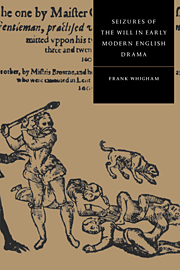Book contents
- Frontmatter
- Contents
- Acknowledgments
- Abbreviations
- Introduction
- 1 Forcing divorce in The Spanish Tragedy
- 2 Hunger and pain in Arden of Faversham
- 3 The ideology of prodigality in The Miseries of Enforced Marriage and A Yorkshire Tragedy
- 4 Sexual and social mobility in The Duchess of Malfi
- Afterword
- Notes
- Works cited
- Index
Afterword
Published online by Cambridge University Press: 17 August 2009
- Frontmatter
- Contents
- Acknowledgments
- Abbreviations
- Introduction
- 1 Forcing divorce in The Spanish Tragedy
- 2 Hunger and pain in Arden of Faversham
- 3 The ideology of prodigality in The Miseries of Enforced Marriage and A Yorkshire Tragedy
- 4 Sexual and social mobility in The Duchess of Malfi
- Afterword
- Notes
- Works cited
- Index
Summary
The rhetorical urge to placement that funds most conclusions faces an impasse here. My analyses constitute no linear argument, and produce no Conclusions or Results. For that matter, the endings to the plays I read do not always play a decisive role in my examinations. I have been much more immersed in quotidian flow or practice or conduct, the way that characters “go on with” the strategies of their lives. The goals of those strategies appear usually only in prospect, and are often evacuated in the event. Sometimes that evacuation is full, as with Walter Calverley's crushing muteness; sometimes merely conventional, as with Scarborrow's “all join hands”; sometimes an instant deflation, as with Black Will's “Now I can take you”; sometimes the point, as with Bosola, “i'th'end, neglected.” So it is with my own closure, where it is clear that I have neglected much in these pages, despite their number: Shakespeare, Middleton, The Witch of Edmonton, Eastward Ho! And the scene broadens uncontrollably, to include a variety of depths left implicit, especially that of the many “historical” and “anthropological” texts that lie behind this book.
Such spreading responsibilities are, I think, the inevitable horizon of such analysis. They stretch beyond one's capacities, without any motionless boundary to relieve one of responsibility. Victorian scholars were perhaps more honest when they shared their “thoughts on” their subjects with us. We now feel, especially when Concluding, the most intense and opposite obligation, to frame and place and even seize our subjects, to master them (were the term still usable), to step back and hold them whole, to reveal them as decisively our own.
- Type
- Chapter
- Information
- Seizures of the Will in Early Modern English Drama , pp. 225 - 226Publisher: Cambridge University PressPrint publication year: 1996



